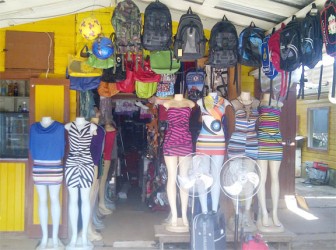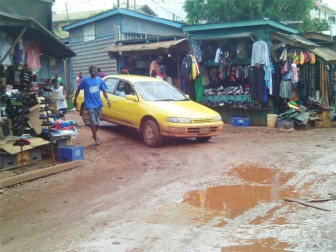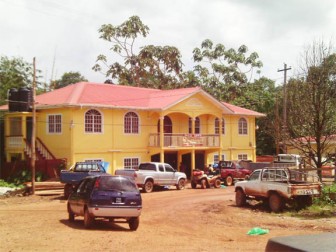At the crowded Port Kaituma central, the gateway to the goldfields of the North West District of Region One, one-time city traders—including many single-mothers—are now looking for their big breaks.
While the transition has been successful for some, others are still trying to get acclimatised to the busy and expensive life in the community, where sometimes exorbitant food, transportation and rent can eat away even the healthiest of profits.
Port Kaituma has every commodity available in the city, but at double the price. A $160 soft drink would cost $300; cooked food costs nothing less than $1,000 and so on. Even phone cards are sold at a cost of an additional $100 on every value.
According to Pauline Williams, 41, life in Port Kaituma is costly, but she is making more that she would have if she had stayed in the city. “Food is a good business here, because people always coming from the backdam and they are always hungry. Fish and chip, fried rice and cook up are the popular choices but these guys come for anything that you have,” Williams, an Ogle, East Coast resident told Stabroek News during recent visit to the community.

Williams sells food every night on a roadside stand. She cooks all the food, which a worker helps her to prepare. Food vendors come out at night in the community, when miners and others travel from the backdam. The vendors take up every available spot they can find in the busy business area, where beverages, hot and cold, and food of many varieties are offered. Despite the variety, fried fish or chicken with fried plantains or potatoes prepared on location are the popular choices among the diners.
Williams, a mother of three, said that she moved to the area in January with her fiancé and plans to return home next month. For her, living in Port Kaituma has been a good experience although she has faced some problems finding acceptance by residents and fierce competition from Brazilians nationals, who have taken over most of the businesses in the area.
She explained that the locals behave as though coastlanders do not have the right to be in the community, but she was defiant. “We still survive,” she said.
The Brazilians, on the other hand, are trying to take over the business in the area and she said the government ought to look into their presence there, since many are being allowed to open restaurants and hotels in the community although they are undocumented immigrants in the country.
She nevertheless said “it is comfortable” for her in the area, although was aware that the cost of living there was very high and the community is in need of proper infrastructure. “…We need to get the road fix, proper drainage, stuff like that,” she said, while noting that the area is too clustered.

Williams explained that sometime the clustered layout hampers her business. Sometimes vehicles are parked in the spot where she sells.
She also said that the area is in dire need of a fire station, while noting that several days before this newspaper’s visit a fuel boat caught on fire and noting could have been done to save it. “If one fire start here is the whole block gone,” she said.
Williams said that she does not miss the city life much since she finds everything she needs in Port Kaituma. “Everything is costly here but you can make a life and a living here,” she said.
While living in the city, she sold clothing but the venture was not that profitable. “If I had known (about Port Kaituma) before I would have come before and maybe I would have achieved everything I needed to achieve in life,” she added.
Another businesswoman similarly proclaimed that “business sweet,” while noting that she had been in Port Kaituma for seven months.
The woman, who vends clothing, did not want her name published. However, she shared that she was a Regent Street, Georgetown vendor before migrating overseas. On her return, she said she found that she could not return to vending on Regent Street and she instead decided to travel to Port Kaituma, where her mother lives and also operates a business. The young mother said that she had no regrets about her decision to relocate to the interior location.
Other clothing and food vendors agreed that business in Port Kaituma was good despite the high cost of living. They are mostly women, who have move to the community to take up trading and apart from the high expenses aside, they all said that they are making more money than they would have if they had stayed in the city.
Stabroek News, did, however, observe temporary plastic structures being used for lodgings by persons who wanted to avoid paying the typically high rents in the area. This newspaper was told that these persons were no doubt coastlanders who travelled to the community to earn a living and opted to squat on the government’s reserve.

Fuel is also big business in the community, where it is sold for $7000 per five gallon bottle. Fuel is sold at almost every location.
And though quite a lot of persons particularly the miners own land cruisers and All Terrain Vehicles (ATVs), those who use taxis have to put up with high prices. The price for a short drop is $1,000. An elderly resident, while awaiting treatment at the Port Kaituma Hospital, noted that she could not afford the $1,000 taxi fare from her home to the hospital. She lived a corner away. She said that there were minibus operators that provided an alternative for residents but the poor states of roads in the community drove them out of business.
Several taxi drivers, some of whom were city residents, said business for them was good. A number of them had elevated their vehicles to make traversing the hilly area and deplorable roads easier.
For Lawrence Lewis, the machinery business in Port Kaituma is very competitive as there are two other machinery stores in the area. He opened his store about two years ago and stated that he had invested a lot into the business and plans are on the cards for the business to move to other parts of the North West. “Business here is quite competitive. You gotta do what you gotta do to survive,” he said.




